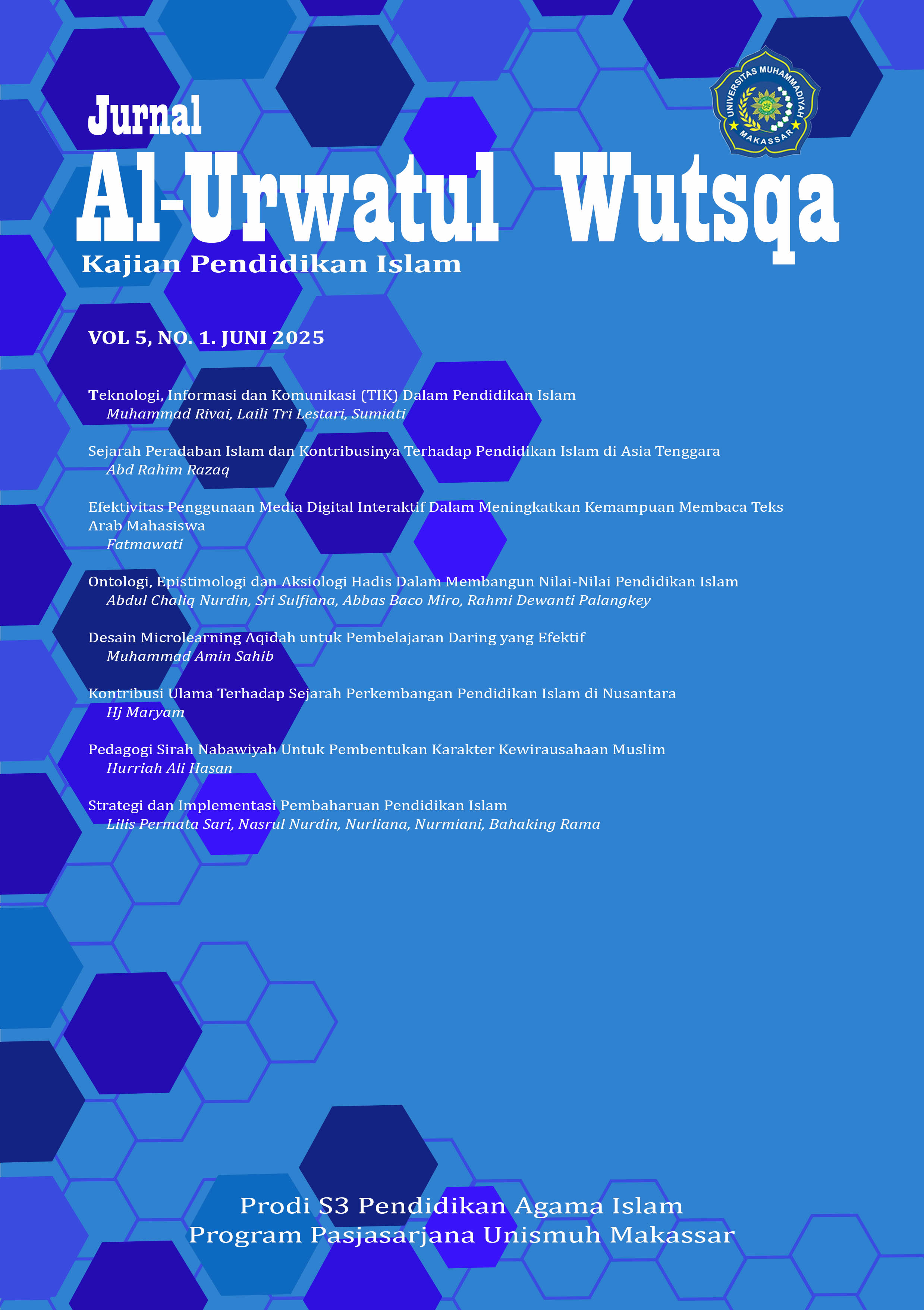Pedagogi Sirah Nabawiyah Untuk Pembentukan Karakter Kewirausahaan Muslim
Sirah Nabawiyah, Pendidikan kewirausahaan, Etika bisnis Islam
Abstract
Artikel ini mengembangkan rancangan pedagogi berbasis Sirah Nabawiyah untuk membentuk karakter kewirausahaan Muslim yang berintegritas, adaptif, dan berorientasi kemaslahatan. Kerangka memadukan empat sifat kenabian—shiddiq, amanah, fathonah, tabligh (SAFT)—dengan kompetensi kewirausahaan (pengenalan peluang, kreasi nilai, ketangguhan, kolaborasi, literasi keuangan, dan etika bisnis). Metodologi yang diusulkan berupa design-based research (DBR) dalam tiga siklus: (1) ko-desain kurikulum dan perangkat ajar berbasis studi kasus sirah, (2) implementasi project-/service-based learning melalui “Pasar Madinah” (simulasi usaha bernilai syariah), dan (3) evaluasi formatif menggunakan rubrik SAFT-Entrepreneurship. Tinjauan pustaka mutakhir tentang pendidikan kewirausahaan, tanggung jawab sosial, dan karakter menunjukkan efektivitas pendekatan berbasis pengalaman dan nilai untuk meningkatkan hasil belajar dan perilaku etis wirausaha pemula. Artikel menyajikan model konseptual, contoh rencana pembelajaran 6–8 pertemuan, rubrik asesmen, serta rekomendasi implementasi di pesantren, madrasah, dan perguruan tinggi. Implikasi praktis mencakup integrasi asesmen karakter ke dalam kinerja bisnis mahasiswa, sementara kontribusi teoretisnya adalah penautan eksplisit SAFT dengan kompetensi kewirausahaan kontemporer serta SDGs.
References
Abd Rahman, S. S., Nadzri, S., & Che Senik, Z. (2024). The Practice of Prophetic Leadership in Strategic Management Process: Reflection of Muslim SME Entrepreneurs. Journal of Management & Muamalah, 14(2), 88–97. https://doi.org/10.53840/jmm.v14i2.219
Ahmed, R., et al. (2024). Metaverse integration in halal marketing: Charting new avenues for ethical engagement. Journal of Islamic Marketing.
Almulhim, A. (2024). The roles of word-of-mouth and religiosity toward halal cosmetics purchase intention. Journal of Islamic Marketing, 15(?).
Amin, H. (2022). Examining new measure of asnaf muslimpreneur success model: A Maqasid perspective. Journal of Islamic Accounting and Business Research, 13(4), 596–622.
Badar, K., et al. (2024). Does employee relations climate mediate the effect of Islamic work ethics on organizational performance? Journal of Islamic Accounting and Business Research.
Gao, Y., et al. (2022). A systematic literature review on entrepreneurial intentions. Frontiers in Psychology.
Hasan, H. A. (2020). Pendidikan kewirausahaan: Konsep, karakteristik dan Implikasi dalam Memandirikan generasi Muda. Pilar, 11(1).
Hassan, H.M.K., & co-authors. (2022). Entrepreneurship Education and Social Entrepreneurial Intention. Frontiers in Psychology, 13, 860273. https://doi.org/10.3389/fpsyg.2022.860273
Igwe, P. A., Madichie, N. O., Rahman, M., & Uzuegbunam, I. (2022). Pedagogical Approaches to Responsible Entrepreneurship Education (REE). Sustainability, 14(15), 9440. https://doi.org/10.3390/su14159440
Jia, H., et al. (2023). Impacts of religiosity and spiritual intelligence on social entrepreneurial intentions. PLOS ONE, 18(5).
Khoiriyah, N., et al. (2023). Integrated Curriculum Model in Character Development Based on Sirah Nabawiyah. Journal of Innovation in Educational and Cultural Research, 4(1), 122–129.
Khuram, S., et al. (2022). The impact of entrepreneurial education on venture capital intention: The mediating role of financial self-efficacy. Frontiers in Psychology, 13, 1046293.
Liu, Y., Lin, C., & Zhao, G. (2022). The impact of entrepreneurship education on college students’ entrepreneurial intentions. Frontiers in Psychology, 13, 978480. https://doi.org/10.3389/fpsyg.2022.978480
Martínez-Gregorio, S., et al. (2021). Effect of entrepreneurship education on students: Evidence from pre–post studies with control groups. The International Journal of Management Education, 19(3).
McIntyre, N., et al. (2023). Investigating the impact of religiosity on social entrepreneurial intentions: A Self-Determination Theory perspective. Journal of Business Research, 156.
Motta, V. F., & Galina, S. V. R. (2023). Experiential learning in entrepreneurship education: A systematic literature review. Teaching and Teacher Education.
Nugraha, D., et al. (2025). The impact of habit and halal involvement on intention to purchase foreign halal food brands among Gen Z. Journal of Islamic Marketing.
OECD. (2021). OECD Skills Outlook 2021: Learning for Life. Paris: OECD Publishing.
Pasar Madinah dan etika pasar awal Islam: ENM Journal (IIUM) – kajian historis normatif.
Putri, D. A., et al. (2024). Investigating e-WOM and halal product knowledge on Gen-Z’s halal cosmetics purchase intention. Journal of Islamic Marketing.
Rajendran, S. D., & Hirawaty, N. (2024). The mediating role of halal supply chain integrity in enhancing performance for halal herbal-based food SMEs. Journal of Islamic Marketing, 15(12).
Topcan, O., et al. (2025). How Islamic work ethics predict work engagement: A double-mediation model. South Asian Journal of Business Studies, 19(4), 743–??.
UNESCO-UNEVOC. (2020). Entrepreneurial Learning for TVET Institutions: A Practical Guide. Bonn: UNESCO-UNEVOC.
Yasin, N. A., et al. (2025). Prophet Muhammad’s Prophetic Business Strategy: Comparison with Management Theory and Character Education Implications. Journal of Economics & Organization.
Downloads
Published
Issue
Section
License
Copyright (c) 2025 Hurriah Ali Hasan

This work is licensed under a Creative Commons Attribution-ShareAlike 4.0 International License.








